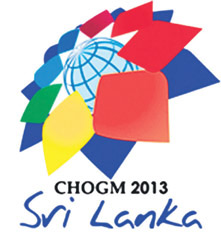
Profile of Commonwealth member countries
Compiled by Manjula Fernando
The origins of the Commonwealth lie in the former British Empire but
today it is an inter governmental organisation of 53 nations (Gambia
withdrew early October 2013) which has equal status 'regardless of size
or economic stature'. It means even the smallest country has a say in
shaping The Commonwealth Policy. The Commonwealth today comprises a
number of states which has no shared history with the British monarchy.
Thirty-two member countries of the Commonwealth are classified as
small states with a population of 1.5 million or less.
Following are brief profiles of member countries and their history to
the Commonwealth. This week's article, the last in the series, features
13 states which became members of the Commonwealth between 1979 - 2009.
The Commonwealth Heads of Government Meeting (CHOGM) 2013 and its
side events will be held from November 10 to 17 in selected venues in
Colombo, Galle and Hambantota.
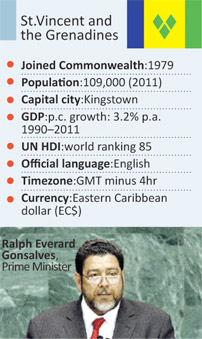 |
St.Vincent and the Grenadines
St Vincent and the Grenadines, one of the Windward Island countries
of the Eastern Caribbean, lies near the southern end of the Caribbean
chain, about 97km north of Grenada. Most of St Vincent is rugged and
mountainous, volcanic in origin and with an active volcano, La
Soufrière, which rises to 1,234m and is the island's highest point. It
last erupted in April 1979.
St Vincent and the Grenadines is a member of the African, Caribbean
and Pacific Group of States, Association of Caribbean States, Caribbean
Community, NAM, Organisation of Eastern Caribbean States, Organization
of American States, UN and WTO.
The most significant environmental issue facing the country is
pollution of coasts and coastal waters by discharges from yachts and
from industrial plants on shore. |
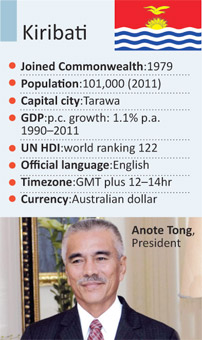 |
Kiribati
Kiribati (pronounced 'Kirabas') spreads across the central Pacific,
intersected by the equator with most other Commonwealth Pacific island
countries lying to its south. Its 33 islands are scattered across 5.2
million sq km of ocean. There are three groups of islands: 17 Gilbert
Islands (including Banaba), eight Line Islands and eight Phoenix
Islands.
In 2010 former President Sir Ieremia Tabai was appointed to the
Commonwealth Eminent Persons Group, which presented its recommendations
for reform in the Commonwealth to Commonwealth leaders at CHOGM in
Australia in October 2011.
Kiribati is a member of the African, Caribbean and Pacific Group of
States, Pacific Community, Pacific Islands Forum and UN.
The UN's 1989 report on the 'greenhouse effect' listed Kiribati as an
endangered country in the event of a rise in sea level during the 21st
century. |
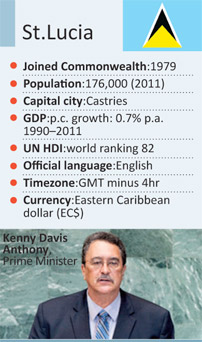 |
St. Lucia
St Lucia is a pear shaped 43km long island, which form an arc jutting
out from the Eastern Caribbean into the Atlantic. It lies south of
Dominica and north of Barbados. It is a mountainous country of volcanic
origin ringed with sandy beaches. The country has more Nobel laureates
per capita than any other country. Poet and playwright Derek Walcott,
born in Castries, St Lucia, was awarded the Nobel Prize in Literature in
1992 and Sir Arthur Lewis was Nobel Economics laureate in 1979.
St Lucia is a member of the African, Caribbean and Pacific Group of
States, Association of Caribbean States, Caribbean Community, Non-
Aligned Movement (NAM), Organisation internationale de la Francophonie,
Organisation of Eastern Caribbean States, Organisation of American
States, UN and WTO. |
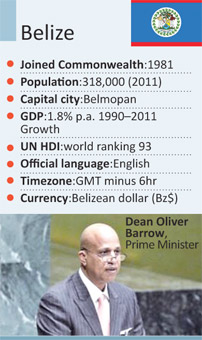 |
Belize
Belize forms part of the Commonwealth Caribbean, and is located in
central America, bordering Mexico to the north and Guatemala to the west
and south.
Of 13 Commonwealth member countries in the Americas, only Belize,
Canada and Guyana lie on the mainland, three of the most sparsely
populated in the association; all the others are islands or
archipelagos.
Belize is a member of the African, Caribbean and Pacific Group of
States, Association of Caribbean States, Caribbean Community, NAM,
Organization of American States, UN and WTO.
Deforestation, solid waste disposal and water pollution from sewage,
industrial effluents and agricultural run-off are the country's most
significant environment issues. |
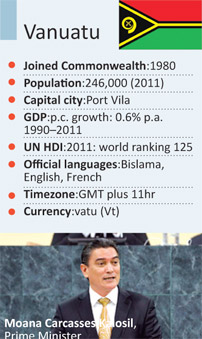 |
Vanuatu
The Republic of Vanuatu's land area is made up of a group of islands
in the south-west Pacific, lying south of Solomon Islands and east of
the state of Queensland in Australia. The country comprises six
provinces: Malampa, Penama, Sanma, Shefa, Tafea and Torba.
Vanuatu is an archipelago comprising a double chain of about 40
islands and 40 islets and rocks of volcanic and coral origin. About 65
of them are inhabited and some islands have active volcanoes. Many are
steeply mountainous, rising to over 1,800m above sea level.
Vanuatu is a member of the African, Caribbean and Pacific Group of
States, NAM, Organisation internationale de la Francophonie, Pacific
Community, Pacific Islands Forum, UN and WTO.
A majority of the population does not have access to a safe and
reliable supply of water althoug fresh water is plentiful. The situation
is improving now. This and deforestation are the most significant
environment issues faced by Vanuatu. |
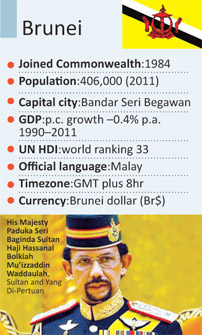 |
Brunei
Brunei Darussalam is a small state in South-East Asia on the
north-west coast of the island of Borneo, in the Indonesian Archipelago.
On the land side, it is enclosed by the Malaysian state of Sarawak,
which divides it in two.
Brunei meaning 'Abode of Peace' is a monarchy. Scholarships for
doctoral study are awarded by Brunei Darussalam to citizens of other
Commonwealth countries under the Commonwealth Scholarship and Fellowship
Plan.
Brunei Darussalam is a member of Asia-Pacific Economic Cooperation,
Association of Southeast Asian Nations, NAM, OIC, UN and WTO.
Seasonal smoke/haze resulting from forest fires in Indonesia is the
most significant environmental issue the country has faced. |
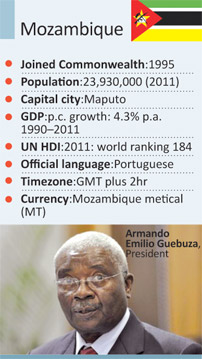 |
Mozambique
Mozambique is in south-east Africa and borders Zimbabwe, South Africa
and four other countries.
The country is divided into eleven provinces.
Graça Machel is the former Chairperson of the Commonwealth
Foundation. Maria Lurdes Mutola, born in Maputo, took the Commonwealth
Games Women's 800 Metres record at the Manchester Games in 2002.
It is a member of the African, Caribbean and Pacific Group of States,
African Union, Indian Ocean Rim Association for Regional Cooperation,
NAM, Organisation of Islamic Cooperation, Southern African Development
Community, UN and WTO.
The most significant environmental issues include desertification and
persistent migration of people from the hinterland to urban and coastal
areas. |
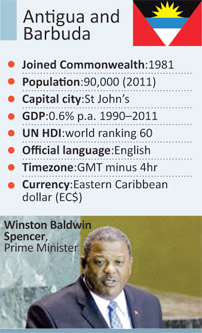 |
Antigua and Barbuda
Antigua and Barbuda, at the north of the Leeward Islands in the
Eastern Caribbean, is composed of three islands: Antigua, Barbuda and
Redonda.
Sir Vivian Richards, born in St John's in 1952, was Wisden Leading
Cricketer in the World in 1976, 1978 and 1980.
Antigua and Barbuda is a member of the African, Caribbean and Pacific
Group of States, Association of Caribbean States, Caribbean Community,
NAM, Organisation of Eastern Caribbean States, Organisation of American
States, UN and WTO.
The most significant environmental issue is limited natural
freshwater resources which is aggravated by clearing of trees to
increase crop production, causing rainfall to run off quickly. |
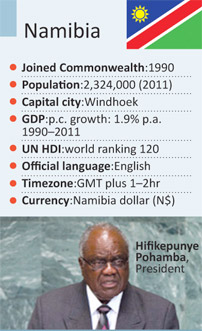 |
Namibia
Namibia in south-west Africa is one of the driest and most sparsely
populated countries on Earth. It is bounded by South Africa to the
south. The Caprivi Strip, a narrow extension of land in the extreme
north-east, connects it to Zambia.
Frank Fredericks, born in Windhoek in October 1967, took the
Commonwealth Games Men's 200 Metres record at the 1994 Games in
Victoria, Canada.
Namibia is one of the world's major producers of uranium; it was
fifth largest in 2011.
Namibia is a member of the African, Caribbean and Pacific Group of
States, African Union, NAM, Southern African Customs Union, Southern
African Development Community, UN and WTO.
The most significant environmental issues are the scarcity of natural
freshwater resources and desertification. |
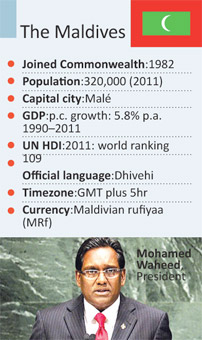 |
The Maldives
The Republic of Maldives lies in the Indian Ocean, some 670km
west-south-west of Sri Lanka. The 1,190 coral islands, 200 of which are
inhabited, occur on a double chain of 26 coral atolls.
The archipelago is 823km long and 130km at its widest. None of the
islands rise higher than 2m above sea level.
Maldives is a member of the Non-Aligned Movement, Organisation of
Islamic Cooperation, SAARC, UN and WTO. Huvadhu Atoll to the south is
the largest true atoll formation in the world and has a lagoon of 2,240
sq km. The distinctive features of the Maldives are its white beaches
and crystal clear lagoons. There are no hills, mountains or rivers. The
most significant issues are depletion of freshwater aquifers threatening
water supplies, global warming and sea level rise, and coral reef
bleaching. |
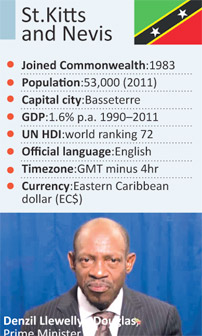 |
St. Kitts and Nevis
The two-island country of St Kitts and Nevis lies in the northern
part of the Leeward Islands group of the Lesser Antilles in the Eastern
Caribbean. The two islands of volcanic origin are separated by a channel
some 3km in width. The biggest island St.Kitts is 37 km long. Celebrated
author Caryl Phillips, born in St Kitts in March 1958, won the
Commonwealth Writers' Prize in 2004 with his book, A Distant Shore.
St Kitts and Nevis is a member of the African, Caribbean and Pacific
Group of States, Association of Caribbean States, Caribbean Community,
NAM, Organisation of Eastern Caribbean States, Organization of American
States, UN and WTO.
Forest covers 42% of the total land area of St Kitts and Nevis and
there was no significant loss of forest cover during 1990-2010. |
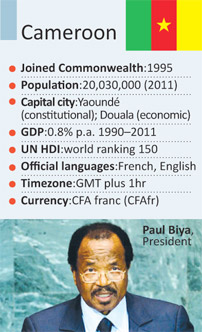 |
Cameroon
The country's name derives from camarões, meaning 'shrimps' after the
15th-century Portuguese explorer Fernando Po named the River Wouri Rio
dos Camarões ('shrimp river'). Located in central Africa Cameroon's
celebrated writers include Ferdinand Oyono, who was born in Ebolowa,
South Province, in 1929; and Mongo Beti, born in Akométan, Central
Province, in 1932 .
Cameroon is a member of the African, Caribbean and Pacific Group of
States, African Union, NAM, Organisation internationale de la
Francophonie, Organisation of Islamic Cooperation, UN and WTO.
The most significant environment issues include desertification,
deforestation, poaching, and overfishing. |
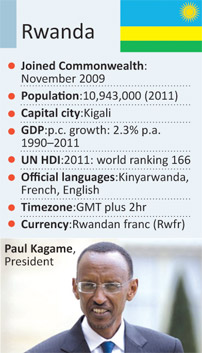 |
Rwanda
The Republic of Rwanda is a landlocked country with land borders with
four countries inclduing Uganda.
Rwanda joined the Commonwealth in November 2009, becoming the
Association's 54th member. Rwanda is a member of the African, Caribbean
and Pacific Group of States, African Union, NAM, UN and WTO among
others. The most significant environmental issues are drought (limiting
the potential for agriculture), overgrazing, soil erosion and
degradation and deforestation due to almost universal use of wood as a
fuel. |
|
|
|

